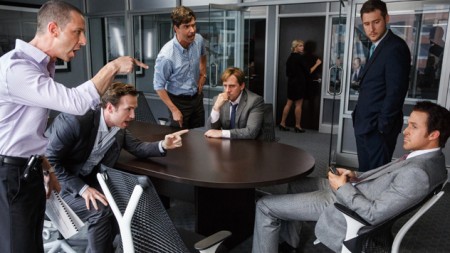Hollywood’s cliff notes version of the 2008 credit crisis is entertaining, cautionary and for those not intricately aware of money management, difficult to digest.
Thick subtext abounds. You don’t have to be a financial prodigy though to understand the main principals of the financial crisis. Economy collapse + Government bail out = Rich got $$$. Beyond this however, specifics are heady. If you’re like me (a millennial!) you are almost required after viewing to follow-up with research, as my generation lost no real money. A swift 11-minute video – YouTube: The Crisis of Credit Visualized is a fun piece of work, and a simple place to start. A Netflix and chill movie this is not; this film and what it recreates will be studied in finance and business courses in college classrooms for years to come.
Based on Michael Lewis’ best selling novel of the same name, this is not a particular subject matter that would make me go to the movies. How many times has Hollywood capitalized on American tragedy? 9/11. World War II. Ben Affleck and J.Lo. How do you make a movie like this even watchable? You make it fast, funny and move like hell. Adam McKay, a former head writer for Saturday Night Live, seizes this subject matter with confidence, poise and presents it like he has the last 10 minutes of airtime on SNL (reserved for alternative experimental comedy).
The movie is seen through the eyes of four sets of individuals and their money teams. We first meet Christian Bale’s character Michael Burry. An eccentric/heavy metal money manager, who discovers that the subprime home loans that banks were lending to people with credit risks is a calamity in the making. Ryan Gosling’s slick Jared Vennet, gets wind of this idea and shadows Burry’s realization, and bets against the banks by shorting the home loans headed for inevitable default. Through happenstance, Steve Carell’s masterfully specific Mark Baum, uncovers the truth about the upcoming credit crisis, and along with his money team, follows suit. Carell also acts as the audience’s moral compass, something we need. Finally, we meet Brad Pitt’s character Ben Rickert. Along with two young money players, they uncover the effects of what this credit crisis will not only do to this country’s economy, but to the entire world’s. McKay also wittily throws in celebrity cameos (i.e. Margo Robbie in a bubble bath) to explain the finer points of financial jargon to keep the Transformer’s Anthology crowd involved. Each character has her/his own personality, editing and dynamism that blends the high anxiety and big risk/reward culture of finance to an almost glamorous, but ultimately tragic, view.
As entertaining as the film is, this tragedy is one we fear will happen again: This is the main take away from the movie, as we learn that the banks are simply putting a new system in place to replace the old. As 2016 begins, the viewer can’t help but consider what the upcoming year will bring nationally and globally. Could we handle another blow to our economy, while economic influences (i.e. Chinese manufacturing reports) help tank our stock market? It’s almost as if the U.S. is the Death Star, appearing robust, but with geological faults beneath the surface. This vulnerability is both abstract and specific, depending upon your interactions with the banking and investments systems.
The future, according Susan Wachter, a real estate and finance professor at the Wharton Business School, who foresaw the disaster well before the collapse happened offers insight. In a recent interview with Time magazine, she argues, the government nationalized the entire residential mortgage market, handing the reins to Fannie Mae, Freddie Mac, and the Federal Housing Authority. Although these entities don’t make dangerous CDOs, and you can’t buy credit default swaps from them, our reliance on them leaves the economy vulnerable. “We’ve nationalized a system that isn’t supposed to be nationalized and that is not sustainable,” Wachter says. “Next time it’s gonna be a different story: It’s not gonna be CDSs and CDOs which take us down. It’s what we put in their place that exposes us.”
What will be put in its place remains unknown, more so in a polarizing election year. These questions leave you pondering The Big Short days after viewing. While it may not be the best picture of 2015, it is perhaps the most concerning.
3 out of 4
Steven Havira: Artist, Actor, Writer/Producer




